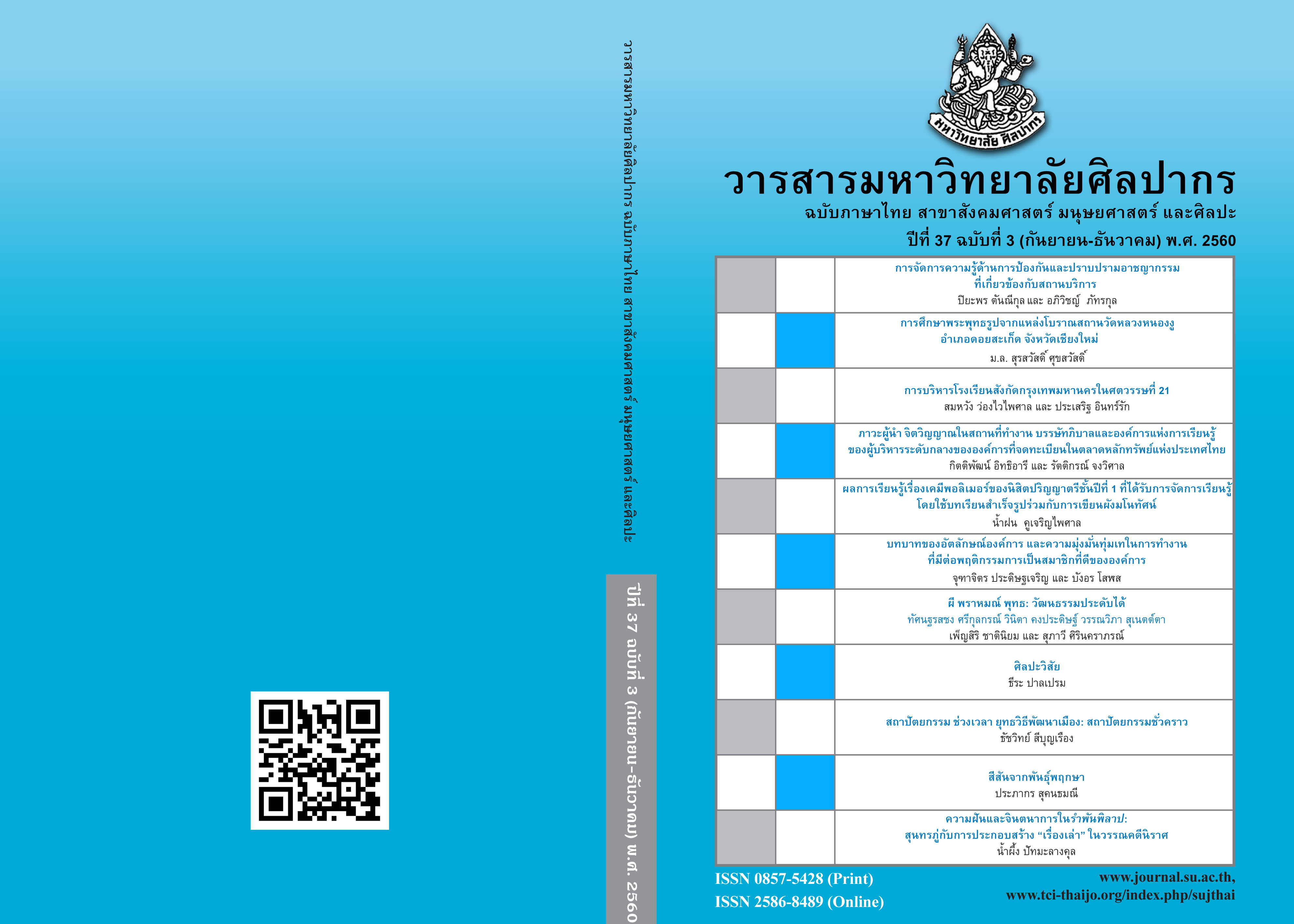ผลการเรียนรู้เรื่องเคมีพอลิเมอร์ของนิสิตปริญญาตรีชั้นปีที่ 1 ที่ได้รับการจัดการเรียนรู้โดยใช้บทเรียนสำเร็จรูปร่วมกับการเขียนผังมโนทัศน์ (Learning Outcomes on Polymer Chemistry of First-Year Undergraduate Students through Learning with Programmed Lesson and Concept Mapping)
Main Article Content
Abstract
งานวิจัยนี้มีวัตถุประสงค์เพื่อศึกษาผลการเรียนรู้เรื่องเคมีพอลิเมอร์ของนิสิตปริญญาตรีชั้นปีที่ 1 ที่เรียนด้วยบทเรียนสำเร็จรูปร่วมกับการเขียนผังมโนทัศน์ (Concept mapping) และศึกษาความพึงพอใจของนิสิตที่มีต่อการจัดการเรียนรู้ กลุ่มเป้าหมายที่ศึกษาคือนิสิตหลักสูตรการศึกษาบัณฑิต สาขาวิชาวิทยาศาสตร์ทั่วไป คณะวิทยาศาสตร์ ชั้นปีที่ 1 จำนวน 1 ห้องเรียน จำนวน 36 คน การวิจัยนี้เป็นการวิจัยกึ่งทดลอง ร่วมกับการวิจัยปฏิบัติการในชั้นเรียนเครื่องมือที่ใช้ในการวิจัย ได้แก่ 1) บทเรียนสำเร็จรูปเรื่องเคมีพอลิเมอร์ 2) แบบประเมินการเขียนผังมโนทัศน์ 3) แบบทดสอบวัดผลสัมฤทธิ์ทางการเรียนเรื่องเคมีพอลิเมอร์ และ 4) แบบสอบถามความพึงพอใจของนิสิตที่มีต่อการจัดการเรียนรู้ วิเคราะห์ข้อมูลเชิงปริมาณโดยใช้สถิติ ค่าเฉลี่ย ส่วนเบี่ยงเบนมาตรฐาน ค่าร้อยละ และเปรียบเทียบคะแนนผลการเรียนรู้ของนิสิตเทียบกับเกณฑ์มาตรฐานร้อยละ 70 โดยใช้สถิติแบบ one-sample t-test วิเคราะห์ข้อมูลเชิงคุณภาพที่ได้จากแบบสอบถามตอนที่ 2 ซึ่งมีคำถามปลายเปิด โดยใช้การวิเคราะห์เนื้อหา ผลการวิจัยพบว่า 1) ผลการเรียนรู้เรื่องเคมีพอลิเมอร์ของนิสิตที่เรียนด้วยบทเรียนสำเร็จรูปร่วมกับการเขียนผังมโนทัศน์มีคะแนนเฉลี่ยคิดเป็นร้อยละ 82.71 (S.D.=7.47) ซึ่งสูงกว่าเกณฑ์ร้อยละ 70 ที่ตั้งไว้ อย่างมีนัยสำคัญทางสถิติที่ระดับ .05 และ 2) นิสิตมีความพึงพอใจต่อการจัดการเรียนรู้อยู่ในระดับมาก โดยมีค่าเฉลี่ยเท่ากับ 4.10 (S.D.=0.37) และนิสิตมีความคิดเห็นที่ดีต่อการเรียนโดยใช้บทเรียนสำเร็จรูปร่วมกับการเขียนผังมโนทัศน์
The purposes of this study were 1) to study learning outcomes on polymer chemistry of first-year undergraduate students through learning with a programmed lesson and concept mappings, and 2) to study students’ satisfaction toward the learning activities.This research is a quasi-experimental research and a classroom action research.The sample group was one classroom (36 students) of first-year science undergraduate students, majoring in general science, drawn by purposive sampling. The research tools consisted of 1) the programmed lesson on polymer chemistry, 2) the assessment form of the concept mapping, 3) the achievement test on polymer chemistry, and 4) the students’ satisfaction questionnaire toward the learning activities.The statistics used for analyzing the collected data were mean, standard deviation, percentage, and one-sample t-test.The qualitative data were analyzed by the content analysis. The results indicated that: 1) the mean scores of students’ learning outcomes were 82.71% (S.D. = 7.47), which were higher than 70% of the criteria at the statistically significant .05 level, and 2) the students’ satisfaction toward learning activities was good level of satisfaction ( = 4.10, S.D. = 0.37). The students showed positive attitudes toward the learning activities using the programmed lesson on polymer chemistry and concept mapping.
Downloads
Article Details
References
Boonprakob, M. (2004). Concept Mapping(ผังมโนทัศน์). Encyclopedia of Education, 26, 111-116.
Bromley, K., Lol., D., & Modlo, M. (1995). Graphic organizer. New York: Scholastic
Chaweangkitpaisal, D., Thananchai, P., & Koocharoenpisal, N. (2010). A Development of Science Learning Achievement on Atomic Structures and Periodic Table for 10th Grade Students Using the Programmed Lesson. (การพัฒนาผลสัมฤทธิ์ทางการเรียนวิทยาศาสตร์ เรื่อง โครงสร้างอะตอมและตารางธาตุของนักเรียนชั้นมัธยมศึกษาปีที่ 4 โดยใช้บทเรียนสำเร็จรูป). Srinakharinwirot University (Journal of Science and Technology), 2(1), 63-74.
Erickson, H. L. (1998). Concept-based Curriculum and Instruction. Calif: Corwin Press.
Fathima, S. (2013). Thinking of Programmed Instruction Design: Need of Today’s Learner. International Journal of Modern Engineering Research (IJMER), 3(2), 1056-1060.
Fults, E. A. (1980). The Effect of an Instructional Program on the Creative Thinking Skills, Self-concept, and Academically Gifted Elementary Students. Dissertation Abstracts International, 41(January 1981), 2931.
Khealalin, N. Tanak, A., & Puempanupat, W. (2014). The Development of Grade 12 Students’ Scientific Conception of Hydrocarbon Compound through Inquiry-based Learning in Combination with Concept Mapping.
Kasetsart Educational Review, 26(1), 125-139.Khamanee,T. (2009). Pedagogy: Body of Knowledge for Managing the Effective Learning Process. (ศาสตร์การสอน: องค์ความรู้เพื่อการจัดกระบวนการเรียนรู้ที่มีประสิทธิภาพ. Bangkok: Chulalongkorn University Press.
Khotthapan, W. (2009). A study on the Achievement in Science and Analytical thinking of Mathayomsuksa II Students by Using Science Activities Learning Packages on Concept Mapping. (การศึกษาผลสัมฤทธิ์ทางการเรียนวิทยาศาสตร์และความสามารถในการคิดวิเคราะห์ของนักเรียนชั้นมัธยมศึกษาปีที่ 2 ที่ได้รับการจัดการเรียนรู้โดยใช้ชุดกิจกรรมการเขียนผังมโนมติ). Master’s dissertation, Srinakharinwirot University, Bangkok, Thailand.
Koocharoenpisal, N. (2010). The Development of A Programmed Lesson on Organic Compounds for Undergraduate Students.(การพัฒนาบทเรียนโปรแกรม เรื่อง สารอินทรีย์ สำหรับผู้เรียนระดับปริญญาตรี). Srinakharinwirot University (Journal of Science and Technology), 2(4), 54-67.
Koocharoenpisal, N. (2012). The Development of the Programmed Lesson on Polymer Chemistry to Enhance Science Learning Achievement for First-Year Undergraduate Students. (การพัฒนาบทเรียนสำเร็จรูปเรื่องเคมีพอลิเมอร์ เพื่อพัฒนาผลสัมฤทธิ์ทางการเรียนวิทยาศาสตร์ของนิสิตชั้นปีที่ 1). Srinakharinwirot Science Journal, 28(1), 37-55.
Koocharoenpisal, N. (2014). The Development of the Programmed Lesson on Electron Configuration and Properties of Elements for the First Year Undergraduate Students. (การพัฒนาบทเรียนโปรแกรมเรื่องการจัดเรียงอิเล็กตรอนและสมบัติของธาตุสำหรับนิสิตปริญญาตรีชั้นปีที่ 1. Srinakharinwirot Science Journal, 30(1), 141-162.
Koocharoenpisal, N. (2014). The Development of the Programmed Lesson on Biomolecules for Undergraduate Students.(การพัฒนาบทเรียนสำเร็จรูปเรื่องสารชีวโมเลกุลสำหรับผู้เรียนระดับปริญญาตรี). Srinakharinwirot University (Journal of Science and Technology), 6(12), 39-58.
Kota, P. (2011). A Study on Science Learning and Analytical Thinking Achievement of Matthayoumsuksa I Stuents by Using Science Activities Learning Packages on Inquiry Process and Concept Mapping. (การศึกษาผลสัมฤทธิ์ทางการเรียนวิทยาศาสตร์และความสามารถในการคิดวิเคราะห์ของนักเรียนชั้นมัธยมศึกษาปีที่ 1 ที่ได้รับการจัดการเรียนรู้โดยใช้ชุดกิจกรรมการเรียนรู้แบบสืบเสาะหาความรู้และการเขียนผังมโนมติ). Master’sdissertation, Srinakharinwirot University, Bangkok, Thailand.
Kunsate, J., Udom, P., & Kuntacha, A. (2008). Effects of Using Cooperative Learning with Jigsaw Technique and Concept Mapping on Science Process Skills and Chemistry Learning Achievement of Matayomsuksa 6 Students. (ผลการจัดการเรียนรู้แบบร่วมมือโดยใช้เทคนิคจิ๊กซอว์ร่วมกับแผนภูมิมโนทัศน์ที่มีต่อทักษะกระบวนการทางวิทยาศาสตร์และผลสัมฤทธิ์ทางการเรียนวิชาเคมีของนักเรียนชั้นมัธยมศึกษาปีที่ 6). Academic Services Journal, 19(3), 23-33.
Kurbanoglu, I. N, Taskesenligil, Y., & Sozbilir, M. (2006). Programmed instruction revisited: a study on teaching stereochemistry. Chemistry Education Research and Practice, 7(1), 13-21.
Noimai, I. (2012). Learning Management in Social Studies Using Graphic Organizers As a Thinking Skill Promoting Tool. Journal of Education, 23(2) : 11-23.
Novak, J. D. (1991). Clarify with Concept Maps: A Tool for Students and Teachers Alike. The Science Teacher, 58, 45-49.
Novak. J. D. (1990). Clarify with Concept Maps and Veer Diagrams: Two Metacognitive Tools for Science and Mathematics Education. Instructional Science, 19, 29-52.
Preszer, R. W. (2004). Cooperative Concept Mapping Improves Performance in Biology, Journal of College Science Teaching, 33, 30-35.
Schrnid, R. F., & Telaro, G. (1990). Concept Mapping as an Instructional Strategy for High School Biology, The Journal of Educational Research, 84(2), 78-85.
Shounchupon, A. (2015). Concept of Self Directed Learning with Education Management. (แนวคิดการเรียนรู้ด้วยการนำ
ตนเองกับการจัดการศึกษา. Journal of Graduate Studies Valaya Alongkorn Rajabhat University, 9(1), 213-221.
Siriprom, P., Udom, P., & Kuntacha, A. (2008). The Development of Scientific Activities Packages based on Inquiry Teaching Method with Concept Mapping for Developing Critical Thinking Abilities of Matayomsuksa 1 Students. (การพัฒนาชุดกิจกรรมวิทยาศาสตร์โดยใช้วิธีการเรียนรู้แบบสืบเสาะหาความรู้ร่วมกับการเขียนผังมโนทัศน์เพื่อพัฒนาความสามารถในการคิดอย่างมีวิจารณญาณของนักเรียนชั้นมัธยมศึกษาปีที่ 1). Academic Services Journal, 19(3), 23-33.
Taylor, M., & Burges. (1995). Orientation to Self-Directed Learning: Paradox or Paradigm?. Studies in Higher Education, 20(1), 87-96.


